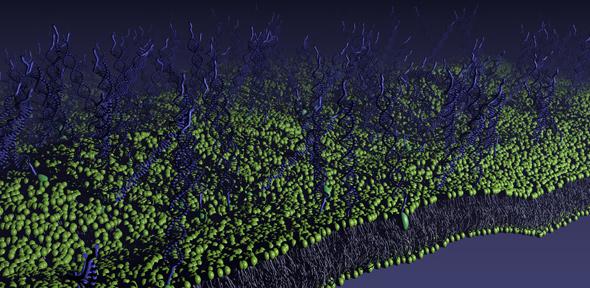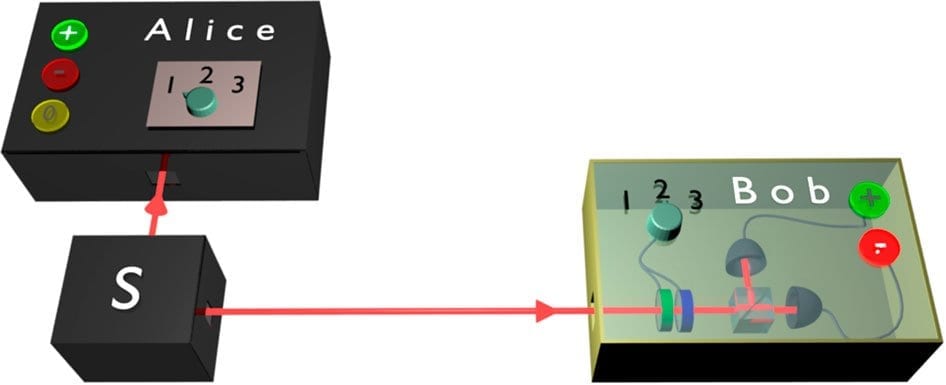Having this kind of control over a material is like a ‘golden ticket’ of sensing
Lorenzo Di Michele
Researchers from the University of Cambridge have developed a new self-assembled material, which, by changing its shape, can amplify small variations in temperature and concentration of biomolecules, making them easier to detect. The material, which consists of synthetic spheres ‘glued’ together with short strands of DNA, could be used to underpin a new class of biosensors, or form the basis for new drug delivery systems.
The interplay between the lipid spheres, called giant vesicles, and the strands of DNA produces a unique response when the material is exposed to changes in temperature. Instead of expanding when heated – as is normally the case – the material contracts, a phenomenon known as negative thermal expansion. Details are published today (7 January) in the journal Nature Communications.
In addition to its role as a carrier of genetic information, DNA is also useful for building advanced materials. Short strands of DNA, dubbed ‘sticky ends’, can be customised so that they will only bind to specific complementary sequences. This flexibility allows researchers to use DNA to drive the self-assembly of materials into specific shapes.
Read more: Responsive material could be the ‘golden ticket’ of sensing
The Latest on: Sensing
[google_news title=”” keyword=”Sensing” num_posts=”10″ blurb_length=”0″ show_thumb=”left”]
via Google News
The Latest on: Sensing
- How ISRO used satellite remote-sensing to analyse glacial lakes in Himalayason April 26, 2024 at 6:36 pm
This is the latest among a clutch of studies on glacial lakes that have highlighted the risks of glacial lake outburst floods (GLOFs), and their impact on infrastructure and settlements downstream of ...
- Sensing defeat, Modi making irresponsible remarks: Siddaramaiahon April 26, 2024 at 2:30 pm
VIJAYAPURA: Claiming that PM Narendra Modi has become desperate after Phase 1 of the ongoing Lok Sabha polls, where he realised that the BJP will not win the ex ...
- Optical barcodes expand range of high-resolution sensoron April 26, 2024 at 11:27 am
The same geometric quirk that lets visitors murmur messages around the circular dome of the whispering gallery at St. Paul's Cathedral in London or across St. Louis Union Station's whispering arch ...
- Medtronic snags FDA approval for body-sensing, closed-loop spinal cord stimulatoron April 26, 2024 at 8:31 am
Medtronic has secured FDA approval for its first closed-loop spinal cord stimulator, designed to take in signals from the body and adjust its therapy automatically. | The Inceptiv implant for chronic ...
- Sensing wood, sculpting ecologyon April 24, 2024 at 7:08 am
Since entering SAIC’s MFA sculpture program, Galen Odell-Smedley has produced a body of work conceptually astute and impeccably fabricated.
- New sensing checks for 3D printed products could overhaul manufacturing sectoron April 23, 2024 at 10:26 am
A sensing technology that can assess the quality of components in fields such as aerospace could transform UK industry.
- Inclusively | Can Wi-Fi sensing help elderly and disabled people live at home independently?on April 23, 2024 at 4:37 am
Inclusivity starts at home. Being able to live independently at home is, for many of us, fundamental to our quality of life. How can technology help us ...
- Diamond-based quantum sensing microscope offers effective approach for quantifying cellular forceson April 22, 2024 at 5:56 am
Cells rely on constant interplay and information exchange with their micro-environment to ensure their survival and perform biological functions. Hence, precise quantification of tiny cellular ...
- Purdue-invented concrete strength sensing system wins Edison Awardon April 19, 2024 at 10:31 am
A Purdue University invention that could help reduce time and money spent on the construction and repair of concrete highway pavement and ...
- How a calcium-sensing protein multitaskson April 17, 2024 at 11:31 am
The calcium-sensing receptor is critical for maintaining healthy calcium levels, but CaSR is also well-known for its side hustles. The receptor is increasingly recognized for its ability to detect ...
via Bing News











